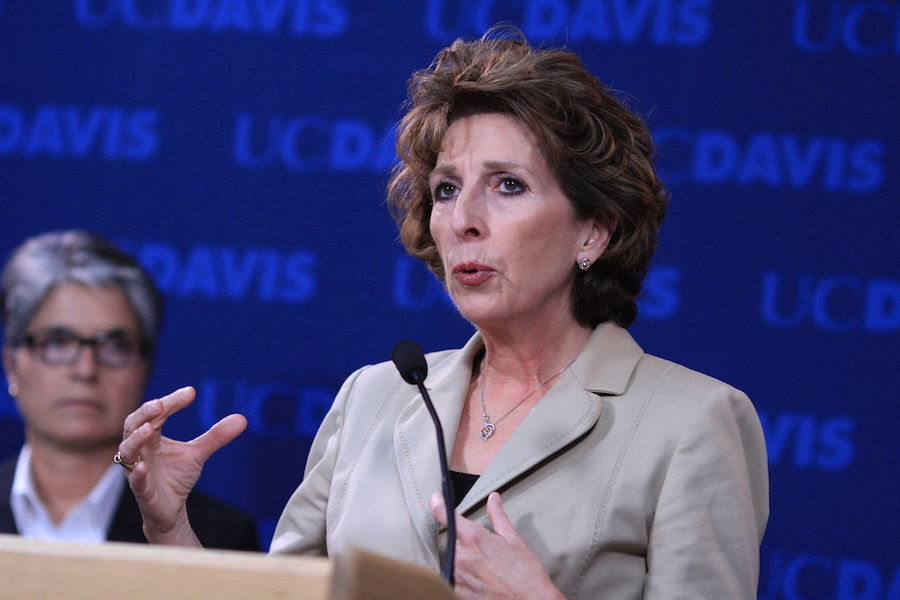
Graduate Student Association, ASUCD Senate pass resolutions calling for concessions from UC President Janet Napolitano
The search for a new UC Davis chancellor continues after the resignation of controversial former chancellor Linda P.B. Katehi, this past August. Now, more resignations could be on the way from Brian Riley and Elly Oltersdorf, the graduate and undergraduate representatives of the Chancellor Search Committee.
The resignations of Riley and Oltersdorf became possible when both the Graduate Student Association (GSA) and the ASUCD passed nearly identical resolutions allowing each of the representatives to give two weeks notice of resignation if certain concessions were not made by UC President Janet Napolitano.
There were five concessions requested of Napolitano: that she use Robert’s Rules of Order to run meetings and send advance agendas to committee members, that non-committee members not speak unless spoken to by a committee member, that demographics about the candidate pool be released, that she fully explain the purposes of the committee and its subcommittees and that no candidate be considered as a finalist unless approved by the committee.
If either representative were to resign, their places on the search committee would remain vacant for the remainder of the search process.
“The whole point of [Riley] and [Oltersdorf] possibly resigning is that they don’t feel their voices are strong enough in the committee […] but if all the demands are met, they don’t have to resign,” ASUCD President Alex Lee said.
In a response to Lee and Oltersdorf regarding the resolutions, Napolitano assured that the student voices on the panel are valuable.
“It is my hope that both [Riley] and [Oltersdorf] will continue as members of this search advisory committee, especially given the very positive contributions they have made thus far in the process,” Napolitano said in a letter to Lee and Oltersdorf.
Because of the recent election of Donald Trump as president of the United States, Riley does not plan to submit a notice of resignation.
“At the time [the GSA resolution] passed, I was hoping to submit right away,” Riley said. “And then Donald Trump was elected president shortly thereafter. That changed things a little bit. […] My undergraduate counterpart, Elly Oltersdorf, pointed out to me that we should proceed carefully on this and not jump into anything without thinking it through carefully.”
According to Katrina Brock, chair of GSA, Riley is only allowed to resign if the concessions listed in their resolution are not met.
“Brian Riley is authorized to resign only if President Napolitano is unwilling to implement basic procedural rules of a deliberative body and give the committee some authority over the search process,” Brock said via e-mail. “It doesn’t help graduate students to have a graduate student on the committee if their presence there is purely symbolic.”
Riley echoed this sentiment of symbolic presence, elaborating further that his and Oltersdorf’s resignation would be a symbolic withdrawal of the student body from the chancellor search.
“That was part of the purpose [of resigning],” Riley said. “It wouldn’t just be a person that was resigning — it would be basically the entire GSA. And with both of us resigning, [Oltersdorf and myself], it would be practically the entire student body.”
In its list of requested concessions for Napolitano, the GSA asked that non-committee members be barred from participating in Chancellor Search Committee meetings except when committee members asked them for information.
“Talking in a general sense, a person who is not a member of a deliberative body does not have standing within that body,” Riley said. “We are talking about guests or staff members, things of that sort […] you’re courting a severe breakdown in procedure when non-committee members are given a free hand, speaking generally.”
Lee is concerned by the seeming imbalance of power on the search committee.
“I have other concerns about the inherent placement of power, where faculty get five [seats on the panel] and they see the nominees earlier on, so you see their preferences more strongly,” Lee said. “[…] The process itself lends the faculty more power in this process. That’s not me saying the faculty are bad or anything, it’s just the way the process is laid out.”
However, Lee appreciates the variety of voices present on the panel.
“I definitely appreciate the collection of campus constituents,” Lee said. “You’ve got the Academic Senate, faculty, undergrads and grads recognized by their respective associations, then you have the alumni association and the staff [..] I also like that, and this is not a shared opinion by everyone, but I like that the faculty aren’t 100 percent from Davis — that this is a UC-wide search.”
Oltersdorf did not respond to interview requests for this story.
Written by: Kenton Goldsby — campus@theaggie.org



